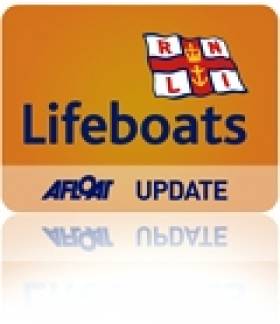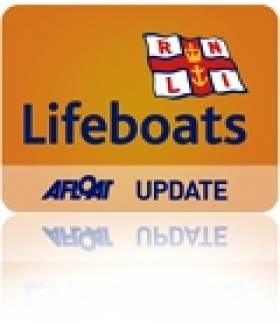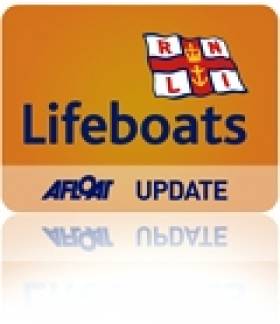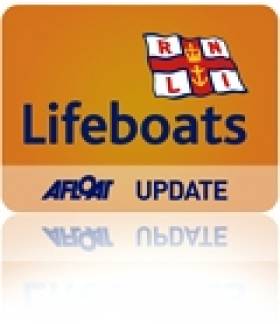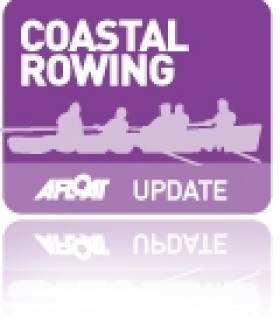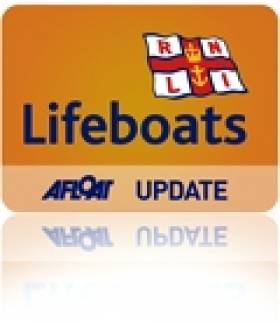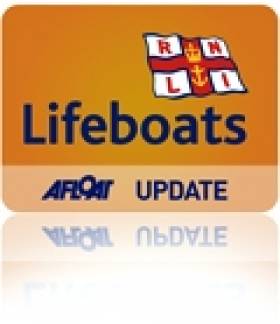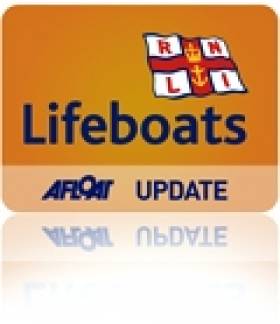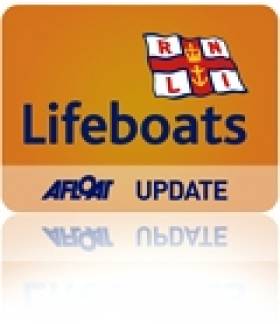Displaying items by tag: Arklow
Arklow Lifeboat Rescues Two From Sinking Yacht
#RNLI - Arklow RNLI's all-weather lifeboat Ger Tigchelaar was launched yesterday afternoon (Saturday 5 April) to a report of a sailing vessel in danger of sinking off the Wicklow coast.
With challenging seas and with visibility deteriorating, the lifeboat proceeded to the scene approximately four miles east of Arklow.
Upon arrival, two Arklow RNLI volunteers were put aboard the stricken 33ft vessel with salvage pumps in an effort to prevent the yacht from sinking.
After efforts to pump out the vessel proved unsuccessful, the yacht's crew of two were evacuated to the lifeboat.
During the rescue, the Commissioners of Irish Lights vessel Granuaile and Irish Coast Guard helicopter Rescue 116 were been tasked to the scene.
With the stricken yacht almost beneath the surface, lines were passed to Granuaile from the yacht, which was then secured to the deck of the larger Granuaile.
And with additional salvage pumps put aboard, the yacht was then pumped out and the ingress of water was stemmed.
The lifeboat stood by and our volunteers tended to the two rescued men as the vessel was pumped out. The Granuaile's crew then handed the lines of the yacht back to the Arklow lifeboat crew and a towline was established before heading back to Arklow Harbour.
Arklow RNLI press officer and sea safety officer Mark Corcoran said: “The professionalism shown by Arklow RNLI’s volunteers, Commissioners of Irish Lights crew members and our coastguard colleagues overhead, not only helped save two lives today, [but] the dedication and bravery by all involved also helped us to save the sinking vessel and return her safely to Arklow.
"This shows how all of our training and exercising with the other agencies on our coast pays off.”
#RNLI - Arklow RNLI’s dedicated volunteers were delighted to be awarded the top prize at this year's St Patrick's Day Parade in Arklow.
This year saw the highest number of parade entries for the Co Wicklow town, including three floats paraded by lifeboat volunteers and fundraisers alike - all of whom had an early start on the day!
Speaking yesterday, chair of fundraising Michael Mordaunt said: “I am simply delighted our St Patrick's Day parade crew have received this award.
"The St Patrick's Day parade is a great opportunity for ourselves as a charity to showcase some of the other events we hold throughout the year to a very large audience.
"As well as this, it is one of the best opportunities we have in the year to say thank you to all of our local supporters.”
The RNLI's next big fundraising drive will be its annual Mayday event in a little over a month from now.
Book Charting History Of Arklow RNLI Launches This Friday
#RNLI - Olympic gold medallist and son of Arklow, Ronnie Delaney, will be on hand this Friday 22 November for the official launch of a new book that charts the history of the Wexford town's lifeboat station.
As previously reported on Afloat.ie, To the Banks & Beyond was written by local historian Jim Rees, who spent a number of years putting together the project that recounts the history of Arklow RNLI from 1826 to the present day in words and pictures.
A limited run of hardback editions has already sold out, but the paperback is still available priced at €15 (plus P&P) via Arklow RNLI Fundraising or the lifeboat station shop at 0402 32850 or [email protected].
Arklow Lifeboat Crew Comes To Aid Of 'Sammy The Seal'
#RNLI - Arklow RNLI’s volunteers were involved in an unusual rescue yesterday (5 November) at Arklow Harbour's boat slipway when they came to the aid of a seal pup.
Lifeboat crew were alerted to the marine mammal's plight by a member of the fishing community who had spotted the seal in an exhausted condition near Arklow lifeboat station.
On arriving at the scene, Arklow RNLI lifeboat volunteer press officer Mark Corcoran made contact with the Irish Whale & Dolphin Group and the Irish Seal Sanctuary to ascertain the best course of action to assist the seal pup. Also on scene was Tommy Heffernan from Avondale Vets.
Arklow RNLI lifeboat crew members including Scott Heaney and other members of the public assisted by keeping onlookers and curious dogs away from the distressed seal, who was determined to be tired and dehydrates following consultations with experts.
It was then decided that it would be best to remove the baby seal - named Sammy by the crew - to the safety of Avondale Vets and, once he was stabilised, to move the seal onward to the Irish Seal Sanctuary.
The pup is now being cared for by the Irish Seal Sanctuary and will enjoy a diet of fresh fish until it reaches a healthy weight and can be released back into the wild.
"It was an amazing experience to get so close to a seal," said Corcoran after the call-out. "They’re really fantastic creatures, and it’s not an everyday occurrence.
"Thanks to the teamwork demonstrated by the different groups involved, the story had a happy ending and I’m really pleased that we could help."
New Book Charts History Of Arklow RNLI
#RNLI - The history of Arklow's lifeboat station from 1826 to the present is recounted in a new book to be published this coming November.
To the Banks & Beyond is written by renowned local writer and historian Jim Rees, who put the project together over a number of years.
A limited run of very collectable hardback copies of the book is being made available for booking prior to the launch, and Arklow RNLI's fundraising branch committee is now inviting presages.
Only 100 copies will be printed at a cost of €25 plus P&P, though a paperback edition (€15 plus P&P) will also be produced. Orders can be placed by contacting Arklow RNLI at [email protected] or via Facebook, or by calling Tony Fennell at 086 256 9787 or Tom Nolan at 086 161 2037.
The book will also be available from Dee-Jay Publications.
Arklow Rowing Club Carry Irish Flag at World Coastal Championships
#WorldCoastalRowing: Three boats from Arklow Rowing Club competed in B Finals at the World Coastal Rowing Championships at Helsinborg in Sweden.
In the men’s single, Cormac Kelly placed fourth of 10, while in the women’s single Jeanne Ní Ghormáin also took fourth in her B Final. The women’s double of Jessica Lee and Deirdre Maghery were third, just 10 seconds behind the winners, Skovhoved Roklub of Denmark.
World Coastal Rowing Championships, Helisngborg, Sweden (Irish interest)
Men
Single – Heat Two (First 8 to A Final; Rest to B Final): 12 Arklow (C Kelly) 24 min 51 secs. B Final: 4 Arklow 23:50
Women
Double – Heat Two (First Six to A Final; Rest to B Final): 8 Arklow (J Lee, D Maghery) 29.38. B Final: 3 Arklow 24:05
Single – Heat Two (First Six to A Final; Rest to B Final): 9 Arklow (J Ní Ghormáin) 33.57. B Final: 3 Arklow 24:05
Arklow Man Greets New Shannon Class Lifeboat
#RNLI - Two maritime legends finally met last bank holiday weekend at the Gathering of the Fleet Maritime Festival when Arklow RNLI lifeboat operations manager Jimmy Tyrell climbed aboard the new Shannon class lifeboat.
Jimmy, and his father before him, lobbied the life-saving charity for many years to call one of their lifeboat classes after an Irish river - and was finally rewarded when the Shannon class lifeboat was put into production last year.
Its arrival at this year’s Gathering of the Fleet in the Wicklow port town was one of the highlights of the event.
The lifeboat is on a tour of RNLI stations to introduce volunteer lifeboat crews to the new vessel, and Jimmy Tyrell was given a warm welcome onboard and had a full tour of the lifeboat from its RNLI crew.
The Shannon class lifeboat is the first all-weather lifeboat to be powered by twin water jets instead of propellers, making it more manoeuvrable and safer to operate in shallow water. It has a top speed of 25 knots and is due to replace the Mersey class lifeboat.
Just prior to the departure of the new Shannon class lifeboat, named Jock & Annie Slater, Arklow RNLI’s crew made a presentation to Jimmy Tyrell and the boat's coxswain to mark the visit and its importance to everyone at Arklow RNLI.
East Coast FM also broadcast their popular morning radio show with Declan Meehan live from the Arklow RNLI lifeboat station, with special guests Diarmuid Gavin and Shane Byrne joined by Arklow RNLI volunteers to get involved in the fun.
The lifeboat crew gave their guests a warm welcome, but had taken the precaution of having a fully kitted-out crew on scene in case they received a call-out during the show.
The Gathering of the Fleet, held in aid of the RNLI, played host to vessels of all shapes and sizes over the August bank holiday weekend.
Commenting on the festival, Arklow RNLI lifeboat press officer Mark Corcoran said: “This weekend was the fruition of months of hard work by the committee. Living on the east coast, the sea is such a big part of everyone’s lives and we wanted to celebrate our proud maritime history and traditions with this Gathering of the Fleet Maritime Festival.
"Thanks to all the boat owners near and far and to the many people who have given their time and energy to make this year’s event something special.”
#rnli – Two maritime legends finally met last bank holiday weekend at the Gathering of the Fleet Maritime Festival when Arklow RNLI Lifeboat Operations Manager Jimmy Tyrell climbed aboard the Shannon class lifeboat. Jimmy and his father before him lobbied the life-saving charity for many years to call one of their lifeboat classes after an Irish river and was finally rewarded when the Shannon class lifeboat was put into production last year.
Its arrival at this year's Arklow Gathering of the Fleet Maritime Festival was one of the highlights of the event. The lifeboat is on a tour of RNLI stations to introduce volunteer lifeboat crews to the new vessel. Jimmy was given a warm welcome onboard and had a full tour of the lifeboat from its RNLI crew.
The Shannon class lifeboat is the first all weather lifeboat to be powered by twin waterjets instead of propellers, making it more manoeuvrable and safer to operate in shallow water. It has a top speed of 25 knots and is due to replace the Mersey class lifeboat.
The Gathering of the Fleet Maritime Festival which was held in aid of the RNLI, played host to vessels of all shapes and sizes over the August bank holiday weekend.
Just prior to the departure of the new Shannon Class Lifeboat "RNLB Jock & Annie Slater" Arklow RNLI's crew made a presentation to Jimmy and the boats Coxswain Tommy to mark the visit and its importance to Jimmy and indeed all at Arklow RNLI.
East Coast FM broadcast their popular morning radio show with Declan Meehan live from the Arklow RNLI lifeboat station with special guests Diarmuid Gavin and Shane Byrne and our own volunteers getting involved in the fun. The lifeboat crew gave their guests a warm welcome but had taken the precaution of having a fully kitted out crew on scene in case they received a callout during the show.
Commenting on the festival Arklow RNLI Lifeboat Press Officer Mark Corcoran said, "This weekend is the fruition of months of hard work by the committee. Living on the east coast, the sea is such a big part of everyone's lives and we wanted to celebrate our proud maritime history and traditions with this Gathering of the Fleet Maritime Festival. Thanks to all the boat owners near and far and to the many people who have given their time and energy to make this year's event something special."
#RNLI - New Zealand man Greg Murphy and his wife Anne have made an emotional journey to Arklow RNLI to visit the lifeboat station where more than a century ago the lifeboat crew set out in heavy seas and torrential rain to save the life of his grandfather.
In 1897 James Murphy was just a teenager when the schooner he was on ran aground and he was saved by Arklow RNLI lifeboat crew.
The details of the call-out were recorded by then honorary secretary of the Arklow lifeboat, James Tyrell, and paint an extraordinary picture of a dramatic rescue which began at 9.45am on 28 March 1897.
James was on the schooner Express with his father, uncle and two crew en route to Wexford from Dublin when in strong winds and driving rain the vessel grounded off Arklow. The skipper was washed overboard and lost.
The Arklow lifeboat - Frances and Charlotte, a pulling and sailing lifeboat under the command of coxswain Richard Wadden - was launched and the lifeboat crew rowed through breaking seas to reach the stricken vessel.
The account goes on to detail how, on rounding the stern of the vessel, the lifeboat itself was filled by “a fearful sea” but emptied seconds later.
The hull of the schooner was under water when the lifeboat neared her and four crew members, including young James Murphy, were clinging to the rigging. In difficult conditions the lifeboat crew cast a line and secured it to the rigging with the plan to get the men to fasten themselves to the rope together and jump overboard.
However it is not known whether they did not hear or understand the instructions, but they only tied James to the rope and lowered him into the water.
He was hauled toward the lifeboat but there was not enough slack to get him onboard and the lifeboat crew shouted to the men to let him go or he would drown. They did so and the lifeboat crew recovered the boy onboard almost lifeless.
Tragically the stranded men had cast off the line and all contact with the wreck was severed. Attempts were made to again throw a line to the men but it was without success. Ultimately the mast went over into the sea, taking the men clinging to the rigging with it and they were lost. The lifeboat crew tried to recover them but were unsuccessful. It was to be the last callout for coxswain Wadden, who retired a short time later.
In subsequent months the Murphy family relocated to New Zealand. But they never forgot the story of the schooner Express and the actions of the Arklow lifeboat crew.
On visiting the lifeboat station more than 116 years later with his wife Anne and meeting with some of the present-day crew, Greg Murphy commented: “On behalf of myself and my very large family back in New Zealand, I want to say thank you for what you do.
"Without the bravery of the men of the Arklow lifeboat back in 1897 myself and my family simply would not exist. Thank you all so very much.”
Arklow RNLI Rescues Couple From Yacht With Fouled Propeller
#RNLI - Arklow RNLI rescued a man and woman after their 12m yacht got into difficulty of the Wicklow coast yesterday afternoon (Wednesday 19 June).
The volunteer crew was requested to launch their all-weather lifeboat at 12.23pm following a report that a vessel was in distress four miles north of Arklow.
The man and woman on board the stricken vessel had been travelling from Scotland and were Arklow-bound on their journey home to Kent when they got into difficulty. Weather at the time was good.
Arriving on scene, the crew on board the lifeboat Ger Tigchelaar - under coxswain Ned Dillon - assessed the situation and observed that the vessel’s propeller had been fouled.
The stricken yacht’s crew had made efforts to clear the fouled lines. A tow line was quickly established and the vessel was towed safely back to Arklow.
Speaking after the call-out, Arklow RNLI volunteer lifeboat press officer Mark Corcoran said: "The man and woman on board the yacht this afternoon came into the lifeboat station to express their appreciation to the crew who were delighted to assist and to be able to bring them and their vessel safely to shore."
Crew members on board the lifeboat included coxswain Ned Dillon, mechanic Michael Fitzgerald, Brendan Dillon, Roger Tyrell and Andy O’Loughlin.



























